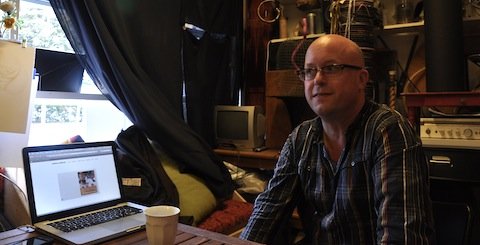
Artist and Supermarket 2012 manager Andreas Ribbung
Roslyn Bernstein
31/01/2012
An Interview with Andreas Ribbung, artist and member of Candyland, Project Manager at Supermarket 2012
Andreas Ribbung is a rebel. Like the Lithuanian-American founder of the Fluxus art movement, George Maciunas, whose 1963 Fluxus Manifesto proclaimed as one of its goals, purging “the world of bourgeois sickness, “intellectual,” professional & commercial culture,” Ribbung and his friends created Candyland, a non-profit art space run by 10 people who take turns in inviting artists to exhibit.
Located in Södermalm, the south east part of Stockholm, where most of the artists' initiatives in Stockholm are located, Candyland was founded in February 2004 as a reaction against the conformity of the art world and the commercialism of art galleries.
The Candyland group of 10, largely artists and photographers but also including a surgeon who is a catastrophe analyst and a publisher, launched their first major collaboration in 2005 with the Candy Tour, a bus tour for groups of 50 people, with a cabin crew in red costumes, free bags of candy for the guests, and a guide who was an art historian. The four-hour site-seeing event had as its first-stop “a viewing of an ugly Greta Garbo portrait on a façade.”
Since that time, with their goal of being provocative, Candyland actions have involved gluing garbage, sorted according to color, at a big art fair and stretching black cotton fabric on a 10 meter wall in Vilnius, when the city was the capital of culture. Invited to participate in an exhibit at the Moderna Museet in 2008, they created After Art: Max Ernst. The group covered the floor with autumn leaves and screened short films, very much in the style of the 1930s, with members dressed up wearing masks of Max Ernst.
The origin of the Supermarket fair goes back to February 2006, when the group created Minimarket, a small-scale art fair which was held at Konstnarshuset in opposition to the new commercial art fair Market. One year later, in 2007 they changed their name to Supermarket. Since then, Supermarket has been growing and gaining respect. “We get better media and we hold a more positive and more vibrant market,” Ribbung said proudly.
With a goal of attracting artist-run galleries and projects in their own spaces, Supermarket 2012, scheduled for February 17-19 in Stockholm, has kept exhibition fees low - about $550 + VAT for a small stand and $690 + VAT for a large stand. This year there were 150 applications and 80 were accepted.
Given its size, funding the fair, Ribbung explains, has become a complicated matter. “The project gets some public funding and there is a little corporate-in-kind funding. There are also some partnerships where we get some of our operational costs covered,” he said. “But mostly, it’s about additions to the programme. We present the funders of our exhibitors at the website. All together it’s lot! And if you also count all the unpaid work hours of all of the artists involved the total is several millions.”
Supermarket also works hard to garner support from various foundations to enable international arts groups to participate. Most of the international groups have an exhibition programme in their own space and invite other artists to exhibit but there are also nomadic platforms and artists groups. No single artists were accepted.
This year there will be several new groups from Norway, Denmark and Finland and, for the first time, two Estonian and two Latvian groups. “Lately,” Ribbung adds, “the Baltic states are kind of “the extra kids in the Nordic family.”
In addition to the art fair, Supermarket now publishes an artist-run art magazine. The first issue appeared in February 2011, with Ribbung serving as Art and Contributing Editor. In his column, Ribbung sung the praises of artist-run initiatives, writing “if the artists, and the initiatives they are involved in, truly want to reach out, to attract the interest of the public at large, to occupy the space that is truly their own, they must seek ways to improve how they promote themselves, how to bring their audience to them.”
That philosophy is exactly what is behind the upcoming Supermarket 2012 that will be opening its doors on February 17th.
Roslyn Bernstein is an arts journalist and a professor of journalism at Baruch College and the CUNY Graduate School of Journalism. She is the author of Boardwalk Stories and the co-author, with Shael Shapiro, of Illegal Living: 80 Wooster Street and the Evolution of SoHo.
She has reported from the United States, Eastern Europe, Israel and China for publications including The New York Times, Newsday, The Village Voice, New York, Parents, Contemporanea, American Banker, Artnews and the Columbia Journalism Review.